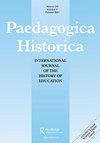新兴生态与变化的关系:新冠肺炎后教育史的简短宣言
IF 0.3
4区 教育学
Q4 EDUCATION & EDUCATIONAL RESEARCH
引用次数: 0
摘要
本文利用摄影作为对受损环境的积极干预,并利用它来发现和发展关于COVID-19后教育过去和未来历史的新视角。在最近关于地球责任和共享生态的讨论的背景下,这些观点变得尤为清晰。这篇论文建议我们将我们的研究议程从人类中心主义的世界观中转移出来,这种世界观非常强调人类主权、现代化、进步和/或衰落、民族国家和全球治理,以及教育系统的分层效应,而没有反映它们的生态后果。它认为,以人类为中心的教育史方法忽视了人体的开放性和脆弱性,以及它与其他生物和物质世界的伦理、文化和社会接近性。因此,本文重点关注教育历史学家应对COVID-19危机的意义,改变研究视角的意义,以及审视在例外状态下拍摄的照片的意义。这篇论文提出了一个后人类中心研究议程的宣言,该议程将教育史和流行病的历史锚定在生命世界和物质世界相互交织的生态中。本文认为,在书写未来的教育史时,必须将新冠肺炎危机视为进一步发展我们对教育认识的挑战和鼓励。本文章由计算机程序翻译,如有差异,请以英文原文为准。
Emerging ecologies and changing relations: a brief manifesto for histories of education after COVID-19
ABSTRACT The paper draws upon photography as an active intervention into compromised environments and uses it to discover and develop new perspectives on past and future histories of education after COVID-19. These perspectives become particularly clear when seen against the backdrop of recent discussions on planetary responsibility and shared ecologies. The paper suggests that we shift our research agendas away from anthropocentric world views that have placed great emphasis on human sovereignty, modernisation, progress and/or decline, nation states and global governance, and the stratifying effects of education systems, without reflecting their ecological consequences. It argues that anthropocentric approaches to history of education have neglected the openness and vulnerability of the human body and its ethical, cultural and social proximity to other living creatures and the material world. The paper therefore focuses on what it means for historians of education to respond to the COVID-19 crisis, what it means to change research perspectives, and what it means to look at photographs that were produced in a state of exception. The paper sets out to propose a manifesto for a post-anthropocentric research agenda that anchors history of education and the history of pandemics in intertwined ecologies of the living and material worlds. The paper suggests that future histories of education cannot be written without considering the COVID-19 crisis as both a challenge and an encouragement to further develop our understanding of education.
求助全文
通过发布文献求助,成功后即可免费获取论文全文。
去求助
来源期刊

PAEDAGOGICA HISTORICA
Multiple-
CiteScore
0.90
自引率
40.00%
发文量
72
期刊介绍:
"Paedagogica Historica is undoubtedly the leading journal in the field. In contrast to a series of national journals for the history of education, Paedagogica Historica is the most international one." A trilingual journal with European roots, Paedagogica Historica discusses global education issues from an historical perspective. Topics include: •Childhood and Youth •Comparative and International Education •Cultural and social policy •Curriculum •Education reform •Historiography •Schooling •Teachers •Textbooks •Theory and Methodology •The urban and rural school environment •Women and gender issues in Education
 求助内容:
求助内容: 应助结果提醒方式:
应助结果提醒方式:


